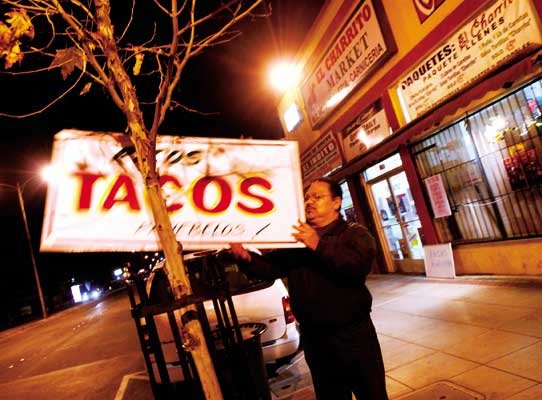Police and restaurant owners pressed by a sour economy clashed
earlier this month over downtown outdoor food stands.
Police and restaurant owners pressed by a sour economy clashed earlier this month over downtown outdoor food stands.
Owners of El Charrito Market and El 7 Mares Restaurant expressed shock Jan. 27 when they received citations for alleged city code violations regarding their outdoor food stands, which they had used to supplement their income in down times. The city has since opted not to impose the fines attached to those citations, but the complaints have prompted a community discussion over the role of street food vendors downtown.
“I’d rather help a business stay open than shut it down,” said Councilman Peter Arellano, who joined Mayor Al Pinheiro and several business leaders during a recent community meeting at Garlic City Billiards.
Both El Charrito Market and El 7 Mares owners say that selling food on the streets of downtown Gilroy has kept their businesses afloat. El Charrito has cooked up tacos on the sidewalk in front of its business, at 7638 Monterey St. Raul Avila, who owns El 7 Mares at 7820 Monterey St., also runs a hot dog stand, Sarita’s Hot Dogs, in front of Garlic City Billiards and in front of his own business on Fridays and Saturdays.
“We’re just trying to stay in business,” Avila said. “For some reason people like to eat outside.”
Several downtown businesses, such as Garlic City Cafe and Sue’s Coffee Roasting Co., also have outside tables, Avila said. In fact, the city expanded its sidewalks through its streetscape program in part to allow for such uses.
However, city code also has prohibitions on street vendors. The city requires that mobile vendors without a permit operate on privates sidewalk, have written permission from the owner to operate and allow access to restrooms.
Scott Barron, code enforcement officer for the City of Gilroy, said he received two complaints about code violations for downtown street vendors before he issued warnings to El Charrito and El 7 Mares. He would not say who made those complaints.
Most attendees at the Garlic City Billiards meeting said it appeared El 7 Mares had been in compliance all along because it has kept its operations on private property, while El Charrito Market was not in compliance because it was on a public sidewalk. Avila argued that his hot dog stand only operates on private property. The restaurant has a few alcoves with sidewalk areas where the hot dog stand has been parked in the past.
Bob Tapella, owner of Garlic City Billiards, expressed concern about the citations and hosted a community gathering at his business to talk about the issue.
The event attracted downtown merchants and restaurant owners, Gilroy Downtown Business Association president Eric Howard, and councilmen Pinheiro and Arellano.
Tapella said most restaurants downtown are closed well before 10:30 p.m., when Sarita’s Hot Dogs operates in front of his business. Such mobile food vendors allow downtown patrons a place to eat without leaving downtown, he said.
“The thing is, there’s nowhere to eat down here (late at night),” Tapella said.
Gary Walton, who owns several downtown properties and co-owns Lizarran Tapas Selectas – perhaps the only downtown eatery that is opened past 10 p.m. on weekends – is all for having more late-night eating options.
He said he has enjoyed “street food” all over the world, and he said street food vendors add to the interest of downtown.
“They shouldn’t just be anywhere, but we shouldn’t discourage it,” Walton said. “I think it’s a legitimate part of downtown.”
Arellano said he felt it was important to help businesses survive in this difficult economy.
Requirements surrounding the placement of street vendors are just one of several downtown code issues, such as the illegal posting of A-frame signs, Pinheiro said. The city is looking at ways to help downtown businesses without violating city code, he said.
“We’re not in the business of putting people out of business but we also have to comply,” Pinheiro said.
The City of San Jose created a new ordinance last year to give street vendors a bit more leeway in their business. Under the ordinance, street vendors operating downtown must obtain a permit from police but are allowed to operate within a 100-square-foot area on most public sidewalks. However, vendors must allow for at least five feet of walkable space on the sidewalk.
Barron said there are no plans at this point to discuss street vendor issues at the council level. However, he said the city is working with El Charrito Market and El 7 Mares Restaurant to determine whether they can maintain street food within city code.
“We’re looking into some of those variables,” Barron said.
In the meantime, other businesses that used to sell food downtown have been more cautious after the city began to issue citations.
Soccer USA, which used to sell tacos in front of its business, decided this week to cease operations.
Soccer USA manager Andrea Ensenada said her business was never cited, but a friend told her that the city was cracking down on downtown food vendors. She wishes the business could continue selling tacos outside, she said.
“Right now, there isn’t that much business,” she said. “People are just trying to make ends meet.”
El Charrito owners Francisco and Karina Andrade said this week that city staff appeared to be working with them to come up with solutions. In the meantime, the store has placed a sign on the street that notifies customers that tacos are being served inside the store.
“It’s just a small business that’s trying to survive, but it’s not easy,” Francisco Andrade said.













